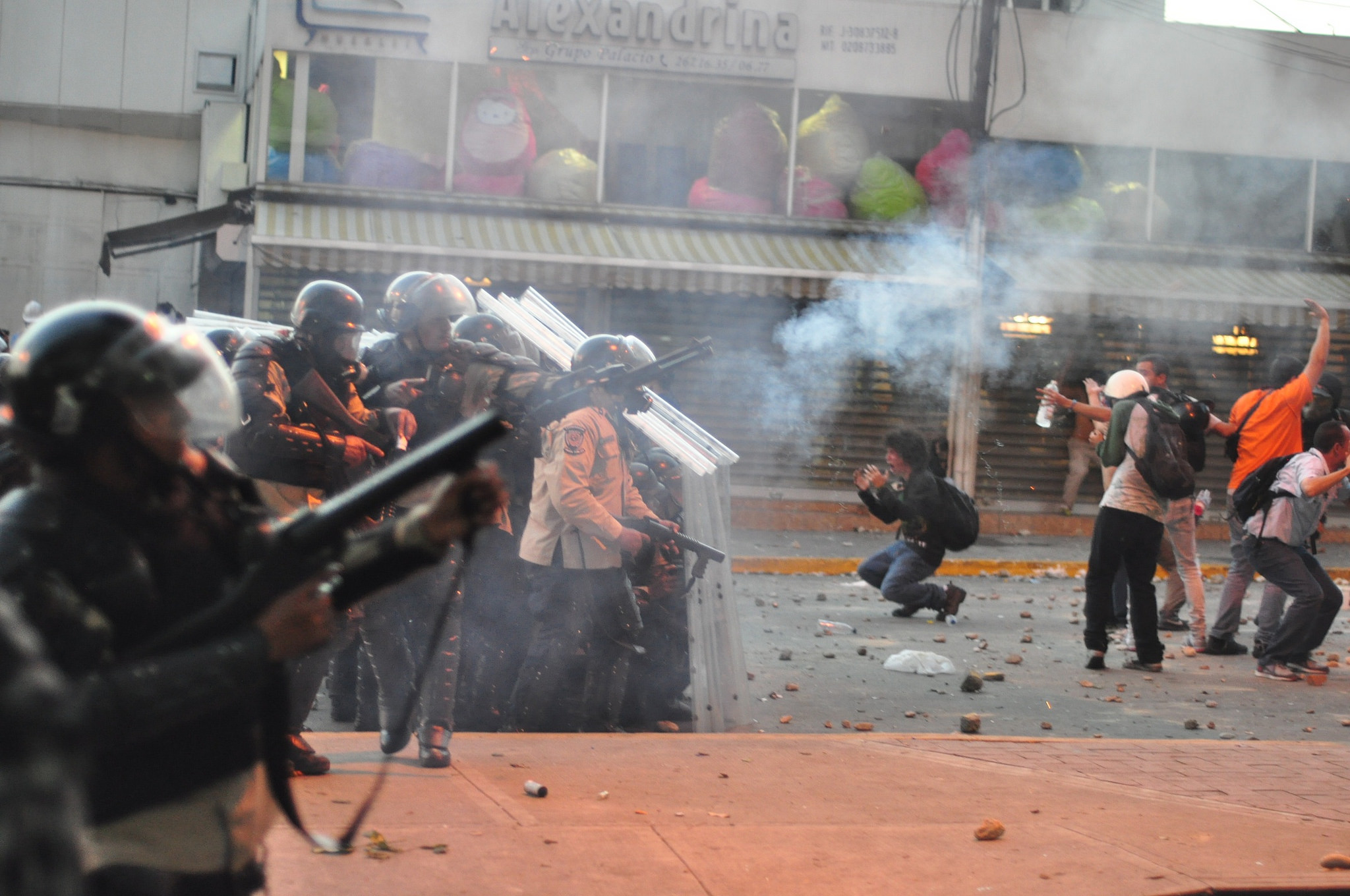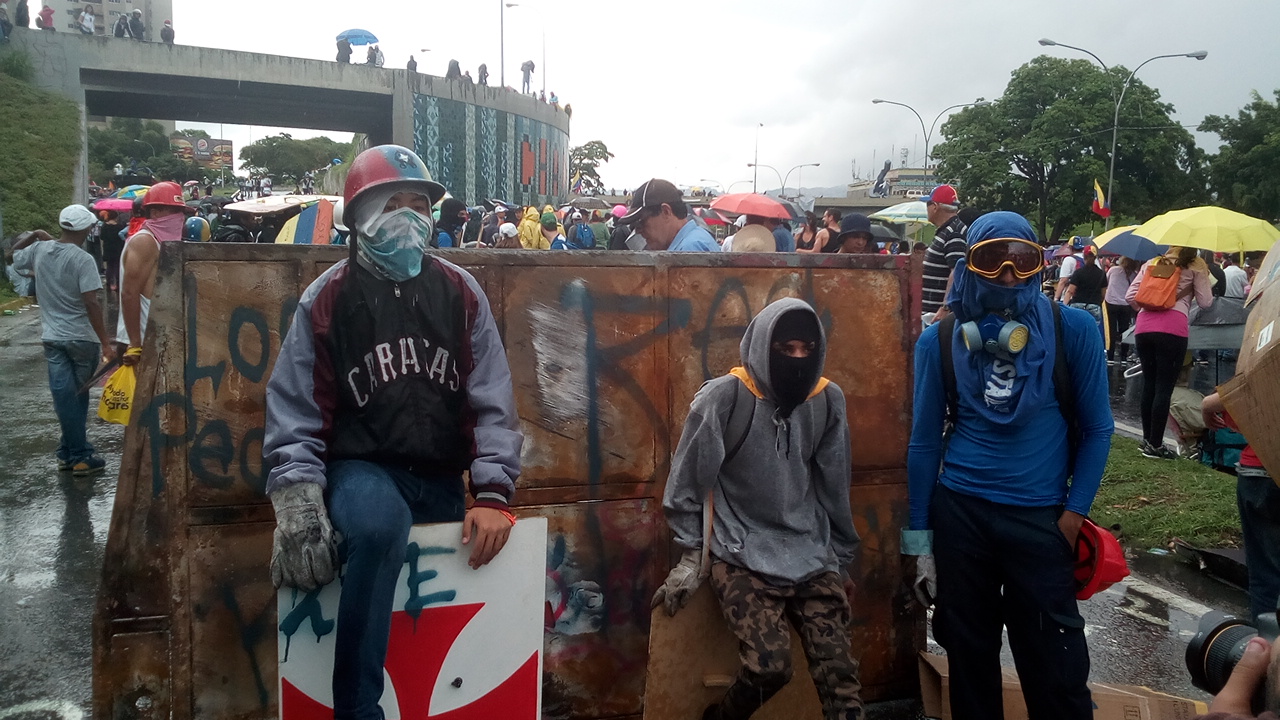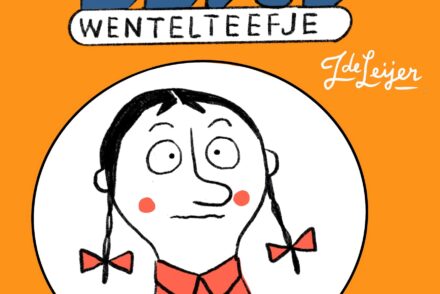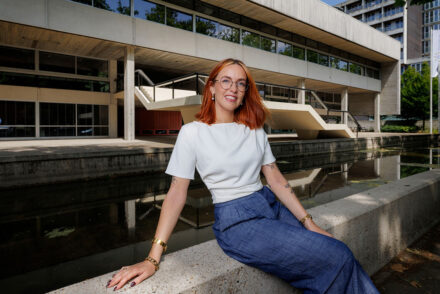Venezuelan student Victoria Barroeta: ‘Change is coming’
While most Tilburg University students were lured from their studies by the sunshine this week, the minds of Venezuelans on campus were distracted by the darkening clouds of a crisis beyond imagination. Victoria Barroeta (22) explains what is going on in her country, and why she remains hopeful that change is on the horizon.
“Sometimes it feels like I’m living a double life,” says Victoria Barroeta. She’s a third-year bachelor’s student at the Tilburg School of Economics and Management, but her mind is often more focused on crisis than on economics.
At times, she explains, the two lives between which she must alternate—the one on the Tilburg University campus and the one in a crumbling Venezuela—force her into an almost schizophrenic situation. Like when one of her friends died in the streets of Caracas in 2017, after he was struck in the chest by a tear-gas canister during the mass protests that rocked the country for months. “When my friend was killed in the protests in Venezuela, I was here studying for my final exams.”
Before she left Venezuela to study abroad, aided by her family’s entire life savings, Victoria marched alongside her friends and loved-ones in the political protests. “In the year that I left, the first big protests took place,” she says. The country was collapsing under shortages of food, medicine and other supplies, as a result of decades of corruption and economic policies that plunged Venezuela into its worst political and economic crisis in history. “There were these crazy lines at supermarkets, with people waiting in line for up to twenty-four hours just to find empty shelves. Inflation was so severe that you needed a month’s salary to pay for a pack of toilet paper or a few bottles of shampoo. The situation was really, really bad.”
A crisis in the making
How did Venezuela, once Latin America’s richest country, get to such a desperate state? That’s a complex question with no easy answer, Victoria says. “It’s actually one of the reasons why I decided to study economics—I wanted to understand what happened in Venezuela.”
According to Victoria, the problems began long before Nicolás Maduro became president. While Maduro contributed to sending the country into chaos, she explains, he is not the root cause. “The crisis we’re in today has been in the making for many years. It’s the result of decades of corruption and economic mismanagement.”
“I wanted to understand what went wrong in Venezuela. That’s one of the reasons why I decided to study economics”
Nicolás Maduro is the political heir of the late president Hugo Chávez, whose 14-year authoritarian reign ended when he died from cancer in 2013. Under Chávez, when the economic collapse of Venezuela slowly began, Maduro served as minister of foreign affairs and later as vice president. “In my 22 years of life, I’ve basically been under the same government,” Victoria says. “And I’ve always known Venezuela as a dangerous country, in which prisons are crowded with political prisoners and actual criminals are out on the streets. My parents and my uncles say that it was different back when they were young, that they didn’t live in this fear. But I haven’t known anything else.”
Chávez was a popular president, Victoria says. He implemented social policies that she characterizes as “good in principle”, such as improved access to education and health care, but these social missions were atrophied by corruption and mismanagement. And while Maduro inherited an economy that was in freefall after the death of Venezuela’s longtime leader, he did not inherit his predecessor’s popularity. As the crisis in Venezuela spiraled out of control under Maduro’s presidency, political tensions rose and Venezuelans started taking to the streets.

Tear gas used against protesters in Caracas, 2017 (Image: Wikimedia Commons)
‘For a moment, I gave up hope’
While studying at Tilburg University, Victoria saw the situation in her country deteriorate. The government continued to print more money to pay its bills, driving up inflation even further, while aggressively tightening its grip on the poverty-stricken country. In a dictator-like move, Maduro stripped the opposition-held parliament of its legislative powers and created a new lawmaking body composed entirely of his supporters—virtually giving him absolute control.
The crisis in Venezuela reached a new boiling point in the spring of 2017, when Maduro’s increasingly repressive leadership sparked anti-government demonstrations on which the government cracked down violently. For months, thousands of Venezuelans took to the streets nearly every day, armed with nothing but swimming goggles, improvised shields and gas masks made out of plastic soda bottles.
“It’s terrible to hear stories of friends and family members who are barely surviving”
“The protests went on for months. So many people were jailed or killed, my friends included,” Victoria says. “It was heartbreaking, but I really believed that something had to come out of it. But after months of protests, day after day after day, nothing happened. Nothing changed. I gave up hope then. I guess we all did. After months of pointless deaths, there comes a point where you stop fighting and you just accept that this is what it’s going to be—a dictatorship.”

Venezuelan protesters, 2017. (Image: Wikimedia Commons)
Juan Guaidó
Disillusioned, Victoria tried to focus her attention on her studies in Tilburg while her friends and family in Venezuela continued to struggle to meet basic needs. “In Tilburg, people have been so supportive. I’ve found a really great support system here, so I feel very lucky. But, still, I’ve often felt very helpless. It’s terrible to hear stories of friends and family members who are barely surviving back home. Last year alone, the average Venezuelan adult lost between 8 and 11 kilograms. People are really struggling.”
But recently, amidst desperation, something unexpected happened. On Wednesday 23 January, a young man named Juan Guaidó stood before thousands in Caracas and swore himself in as Venezuela’s interim president. “He came out of nowhere—this young leader who demanded Maduro to step down and who inspired such hope again,” Victoria says. “I cried when I watched the video of his speech. You couldn’t see the end of people gathered in the streets in support of him, all singing the national anthem. It was incredible.”Juan Guaidó is the leader of the opposition-controlled parliament that was sidelined by Maduro. He was a relatively unknown figure until recently declaring Maduro’s government illegitimate. According to the opposition, Maduro’s controversial re-election in early January was a sham, which means he can no longer be recognized as president.
“With no legitimate president in Venezuela, our constitution says that the leader of parliament becomes president until new national elections can be held. And the leader of parliament is Juan Guaidó,” Victoria says. “Sometimes people think this was a coup d’état, but that’s a misconception. Constitutionally, legally and legitimately, Guaidó is the interim president of Venezuela.”

Juan Guaidó singing the anthem. (Image: Wikimedia Commons)
A peaceful way out
With two opposing leaders claiming to be the president of the country, is there a peaceful way out for Venezuela? Victoria remains hopeful. “With the national and international pressure that is growing every day, it is my hope that Maduro will step down peacefully.”
“We lost a battle, not the war”
Last weekend, deadly clashes broke out in border towns as Maduro blocked food aid and medical supply from getting into Venezuela. After the weekend, Guaidó called on the international community to consider “all options” to remove Maduro from power. But Victoria hopes it won’t come to armed conflict. “I won’t lie, what happened over the weekend hit me and many Venezuelans really hard. Maduro’s regime was burning aid trying to reach the country and killing people without hesitation. It was heartbreaking to see what happened, but we still have a lot of hope.”
“I like to think that we only lost a battle, not the war,” Victoria says. “Change will come. It’s been over twenty years of this regime, we just need to hang on a bit longer.”






